The 15 Best Body Lotions, Reviewed by Dermatologists and Tested by Editors
Apply these non-greasy hydrators on repeat.

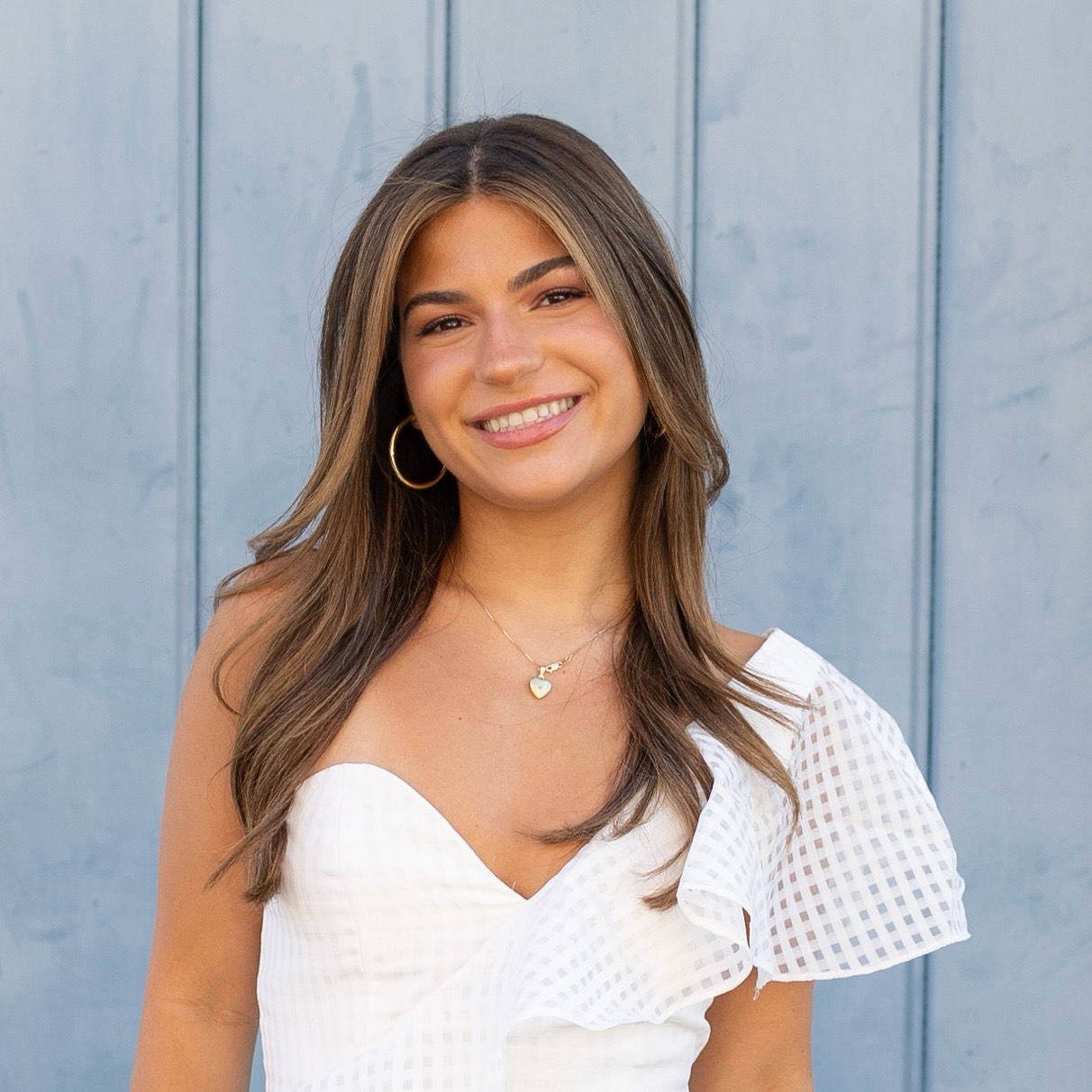
Typically, facial skincare gets all the love and attention in the beauty industry. I'm constantly re-stocking my favorite serums, creams, and sunscreens. And yet, all skin is skin—and most of it falls below the neck. That’s where the best body lotions swoop in to enhance your moisture levels from head to toe. While every person's body skincare regime will differ a little bit, it’s safe to say that hydration should be the baseline. Especially if, like me, your skin starts to get dry and ashy this time of year.
“Sun damage, natural aging, and hormonal changes will all result in dry skin and contribute to itchy and aged-appearing skin,” explains board-certified dermatologist Nava Greenfield, MD FAAD. “Using a body product regularly can help mitigate these factors and keep skin healthy.”
Luckily, there’s a body lotion for everyone and every skin type: some are scented for the fragrance-lovers, others are fragrance-free and ideal for sensitive skin; a handful will leave a glowy shine, but there are a few nourishing picks that dry down matte. I have quite the collection in my shower, (for max hydration, apply lotion to slighly damp skin—trust me), including favorites from cool-girl brands like Byredo and Nécessaire, staples from Vaseline (underrated, in my opinion), and newer discoveries like Soft Services Care Cream, which I'm currently testing and loving.
Keep scrolling to shop my beauty-editor approve body lotion picks, and learn the best hydration tips from board-certified dermatologists.
The Best Body Lotions
- Best Body Lotion Overall: Nécessaire The Body Lotion
- Best Fragranced Body Lotion: Byredo Mojave Ghost Body Lotion
- Best SPF Body Lotion: Supergoop! PLAY Everyday Lotion SPF 50
- Best Body Lotion for Rough Skin: First Aid Beauty KP Smoothing Body Lotion With 10% AHA
- Best Body Lotion for Sensitive Skin: La Roche-Posay Lipikar AP+ Triple Repair Moisturizing Cream
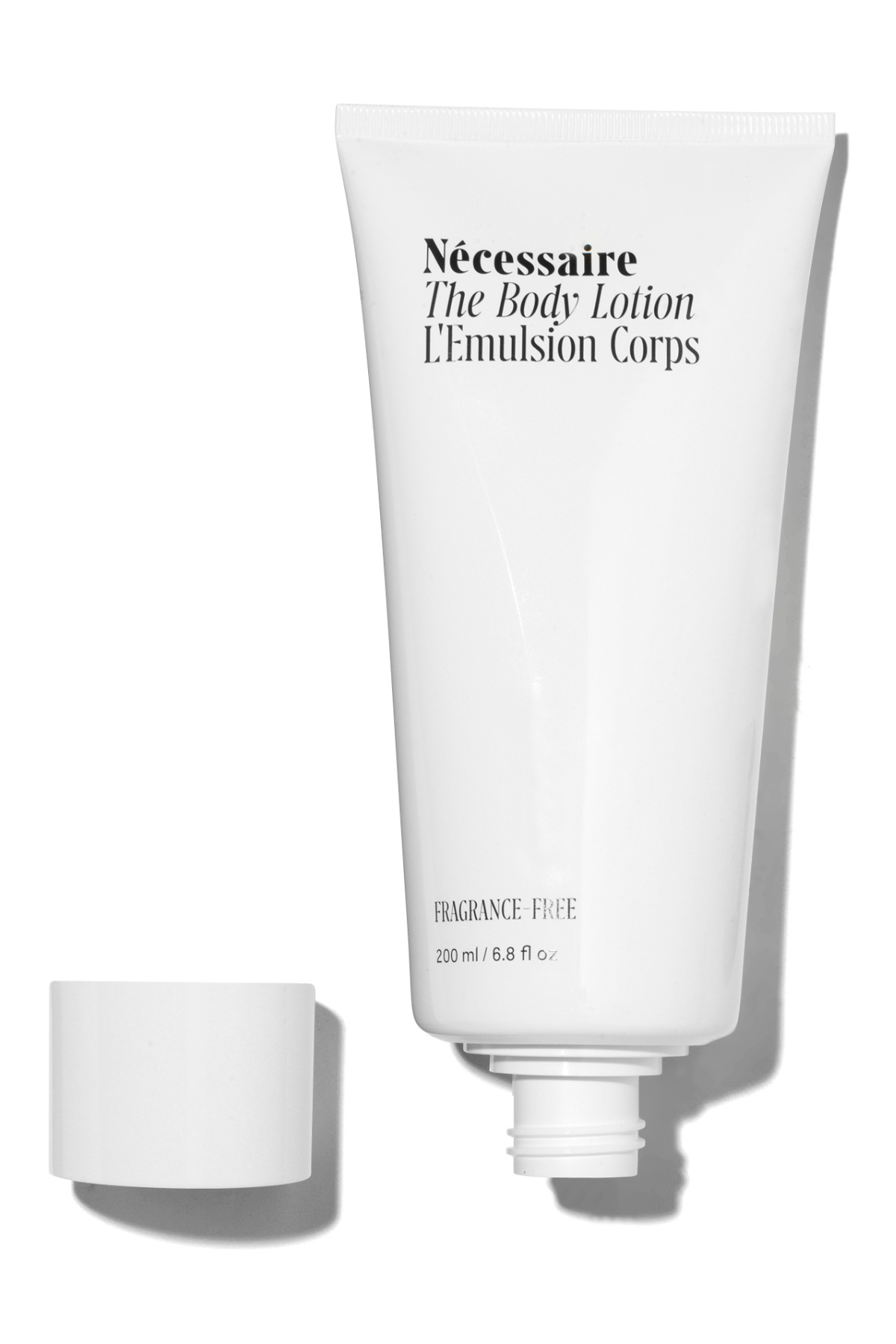
For a fragrance-free formula that does more than just hydrate, Nécessaire is the way to go. It’s a multi-tasker at its core, with the ability to moisturize, strengthen, firm, and brighten the skin with every single use. How, you ask? Just look at the ingredients. This tube contains vitamin C and niacinamide (brightening!), as well as peptides (hydrating!). It does take a bit of work to get this to sink into the skin, but once it absorbs you’re left with a matte, albeit hyper-moisturized complexion.
Key Ingredients: Niacinamide (strengthens skin barrier), peptides (firming), lipid-rich plant oils and butters (moisturizing)
Scent: None
Size: 6.8 oz
What We Love: Fragrance-free; Strengthens skin
What We Don't: Not hydrating enough for dry skin
Review for MC: "I've been using Nécessaire's The Body Lotion for years—it's my holy grail body product. I'm a perfume purist, so I tend to shy away from body lotions and oils with fragrance, as I usually don't mix or layer scents and want to avoid having them clash. This unscented lotion is packed with good-for-your-skin ingredients like peptides, niacinamide, fatty acids, shea butter, and plant oils to quench thirsty skin while strengthening its moisture barrier. This texture is not too light or too rich; it's just balanced enough to leave my skin feeling nourished and deeply hydrated without ever feeling greasy, making it the perfect formula for dry winter skin and gross, sticky summer days alike." — Jenna Igneri, Freelance Beauty Writer
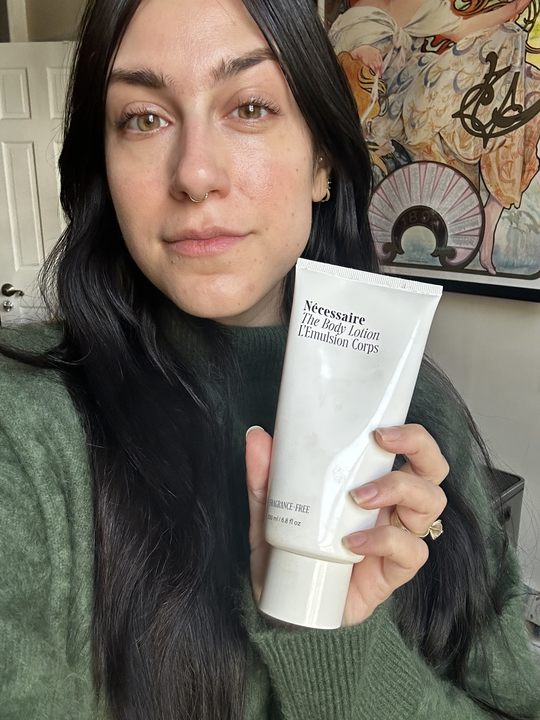
Freelance Beauty Writer Jenna Igneri uses Nécessaire The Body Lotion
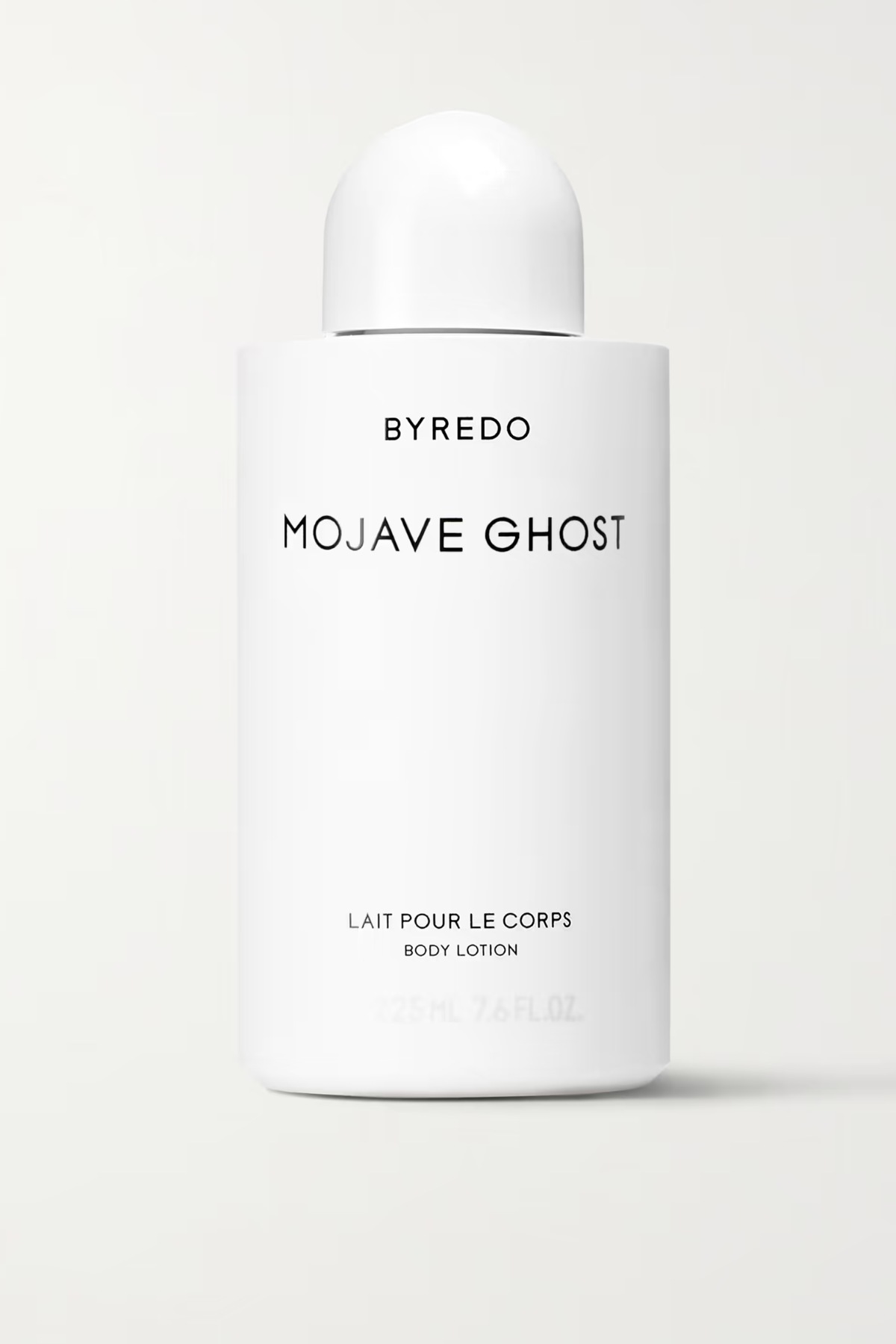
Mojave Ghost is one of Byredo’s best-selling fragrances. It’s mysterious and alluring yet still fresh thanks to its blend of woody and floral notes. Given the scent’s fan-favorite status, the brand has expanded the Mojave Ghost range into the body-care category with this luxe body lotion. The scent is calming and relaxing and lingers on every inch of skin for the entirety of the day. There’s no greasy finish, which makes applying it the perfect pre-bed sensorial ritual.
Key Ingredients: Water, shea butter (moisturizing), parfum (fragrance)
Scent: Amrette, Jamaican Nesberry
Size: 7.6 oz
What We Love: Long-lasting scent
What We Don't: Not deeply hydrating, so not ideal for drier skin types
Review for MC: "The smell of this lotion really steals the show. Its unique scent is popular for a reason—and after using it, I completely understand its cult-favorite status. I applied the product right after an 'everything' shower, and the delicious fragrance lasted all night long! The texture is extremely lightweight but still super hydrating. And I loved the glow and smooth feel it gave my skin." — Emma Aerin Becker, Freelance Beauty Writer
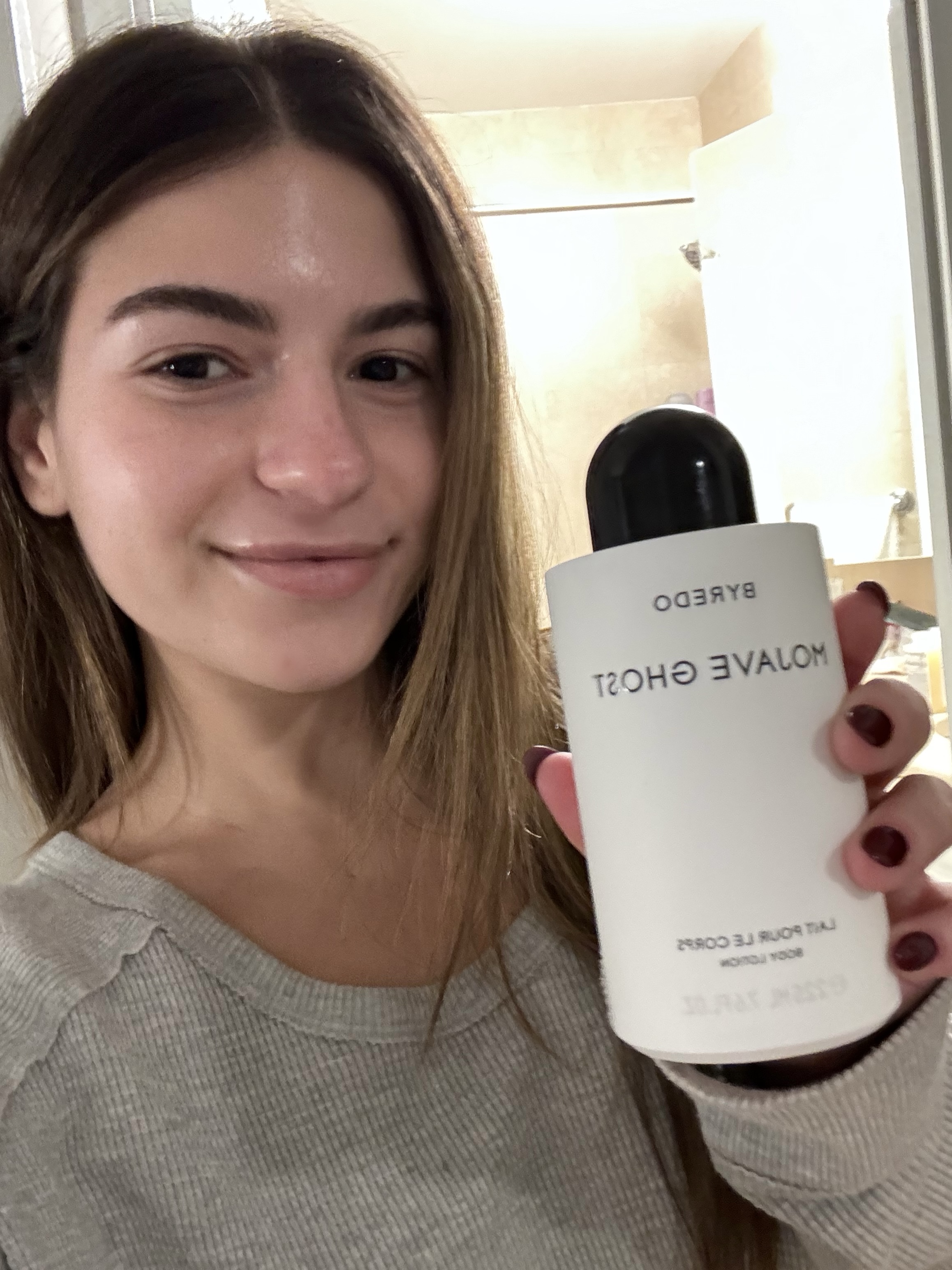
Freelance Beauty Writer Emma Aerin Becker uses Byredo's Mojave Ghost body lotion
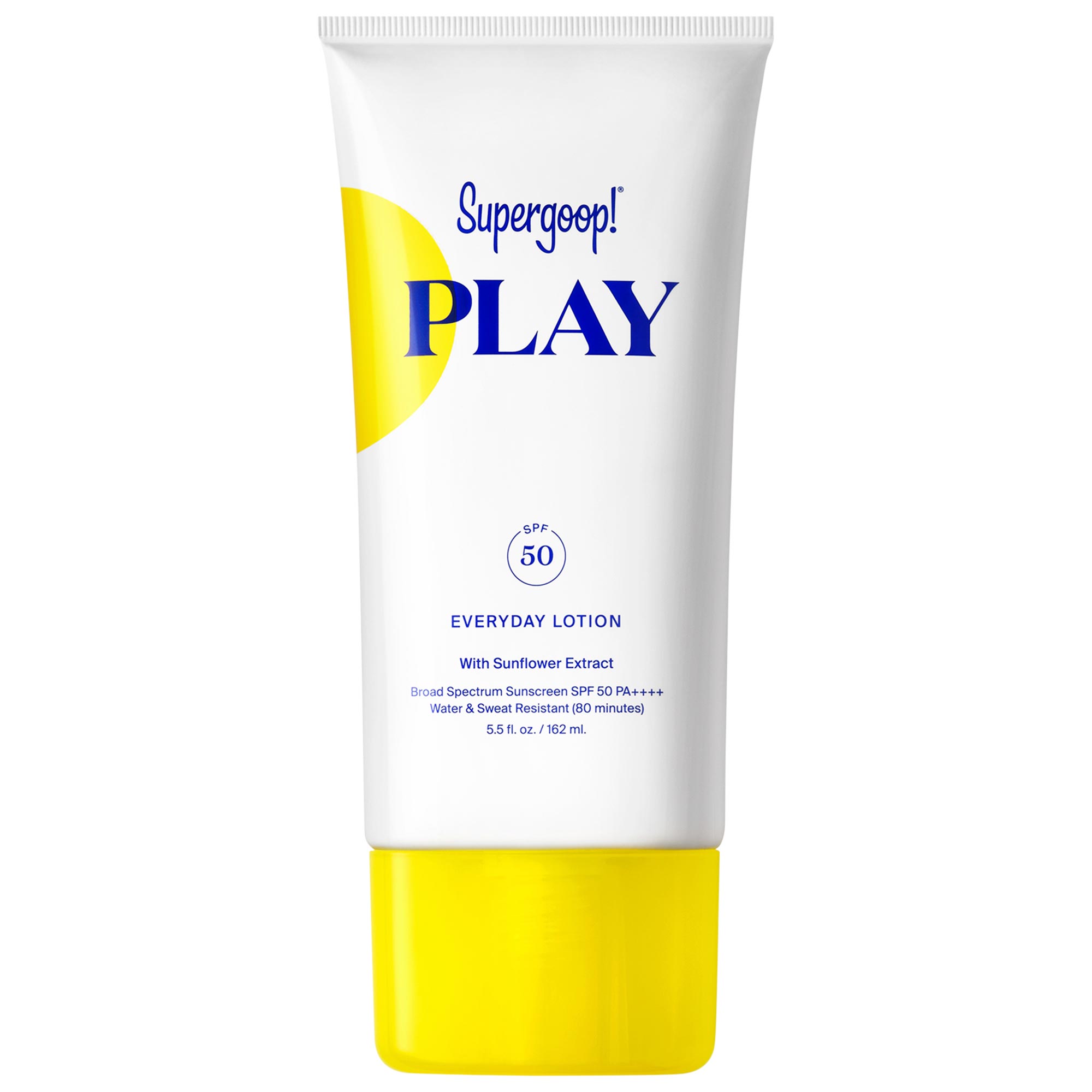
Supergoop!'s Play Everyday Lotion is the perfect product for spending time in the sun—be it a day spent outside or a holiday vacation. (Remember, sun protection isn't just for the summer!) Unlike your average sunscreen, it's fast-absorbing, non-greasy, and water- and sweat-resistant. Plus, it works for both your face and body to hydrate and protect your skin from sun damage.
Key Ingredients: SPF 50 (sun protection), rosemary leaf extract (calming), sunflower extract (moisturizing)
Scent: Citrus
Size: 5.5 oz
What We Love: Non-greasy sunscreen, fresh scent, for all skin types
What We Don't: Very thin, so you need a lot of product to cover your body
Review for MC: "As a skincare enthusiast, seeing SPF 50 on a popular product makes my eyes light up. At first glance, I was nervous that the lotion's thin texture would detract from its hydrating abilities. But to my surprise, it kept my skin moisturized and smelling fresh with its lemony, zesty scent. Supergoop!'s Play Everyday Lotion is definitely my new beach day go-to." — Emma Aerin Becker, Freelance Beauty Writer
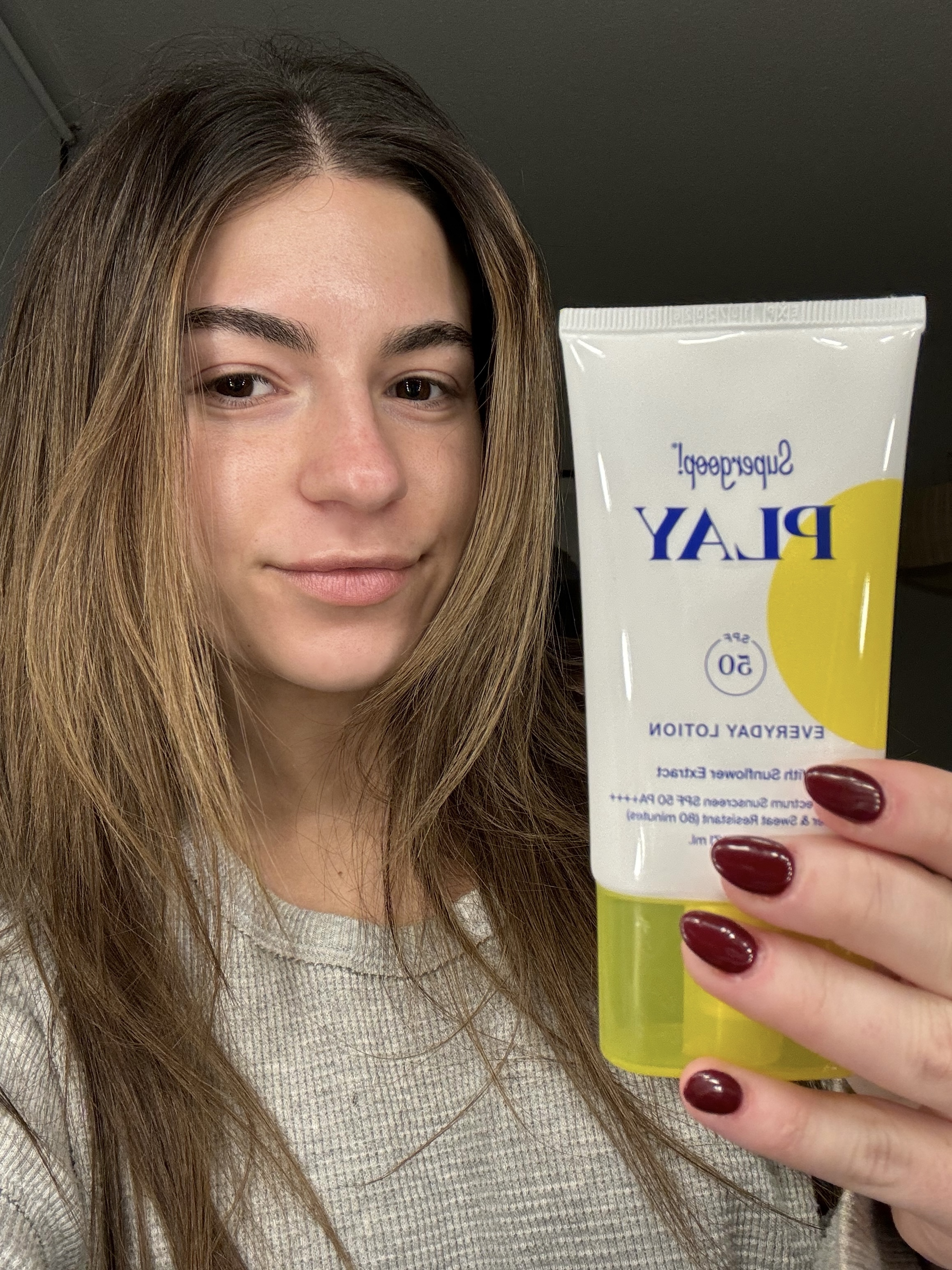
Freelance Beauty Writer Emma Aerin Becker uses the Supergoop! Play Everyday Lotion
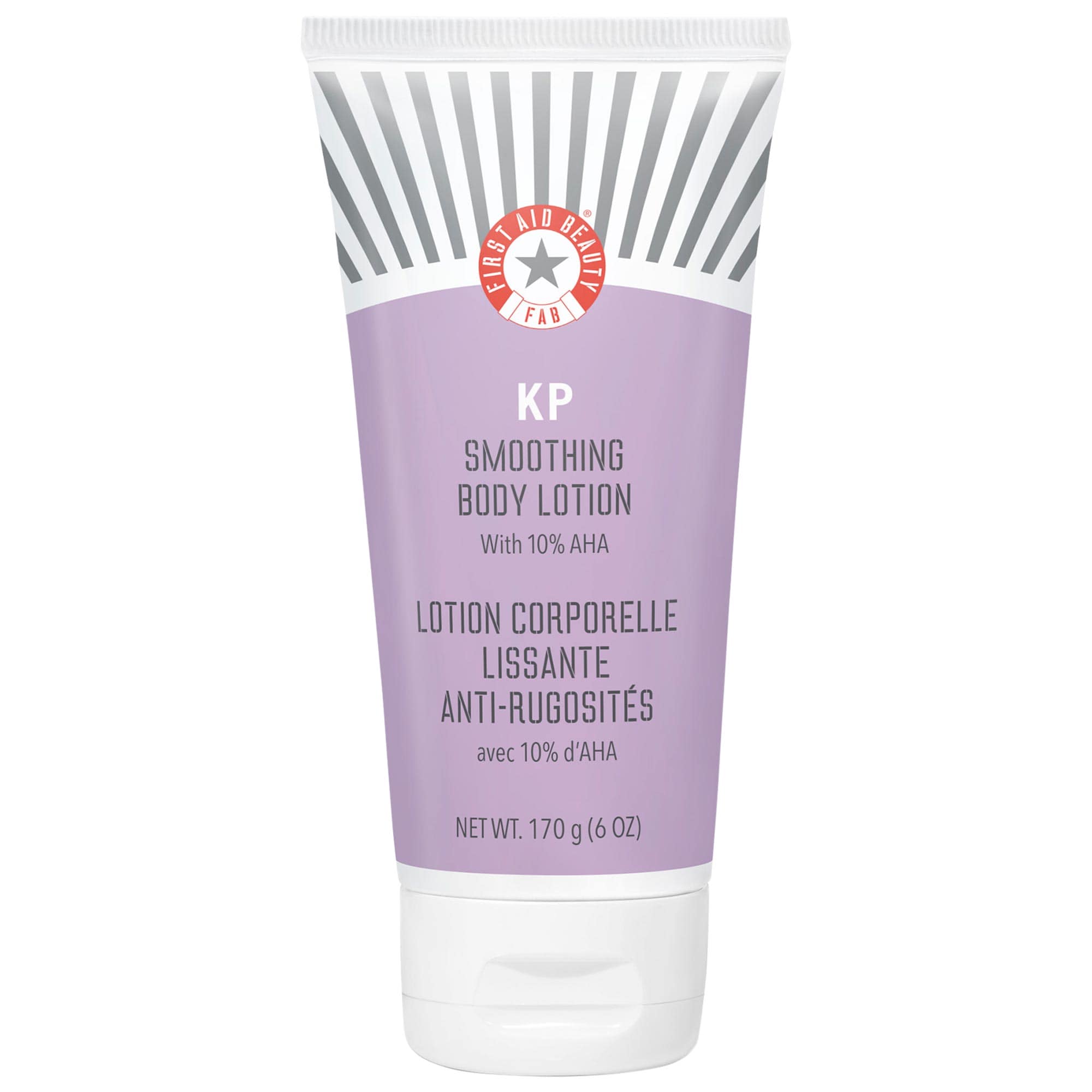
Rough, textured skin is no match for First Aid's Smoothing Body Lotion. This product combines the skin-brightening benefits of a chemical exfoliant and the hydration properties of a moisturizer to visibly banish bumps and nourish skin. It's formulated with 10% lactic acid (an alpha-hydroxy acid) to visibly resurface the top layer of skin and colloidal oatmeal to calm any irritation.
Key Ingredients: Lactic acid (exfoliates), urea (hydrates), colloidal oatmeal (calms)
Scent: None
Size: 6 oz
What We Love: Great for dry, uneven skin, multi-beneficial
What We Don't: Slight medicinal scent
Review for MC: "As someone who struggles with eczema, this lotion has become my new best friend. I apply all over—or on specific areas where rough patches pop up—and watch as the product transforms my distressed, dry spots. The thin texture feels airy, and I love the incredible ingredient list. I really can't recommend this moisturizer enough!" — Emma Aerin Becker, Freelance Beauty Writer
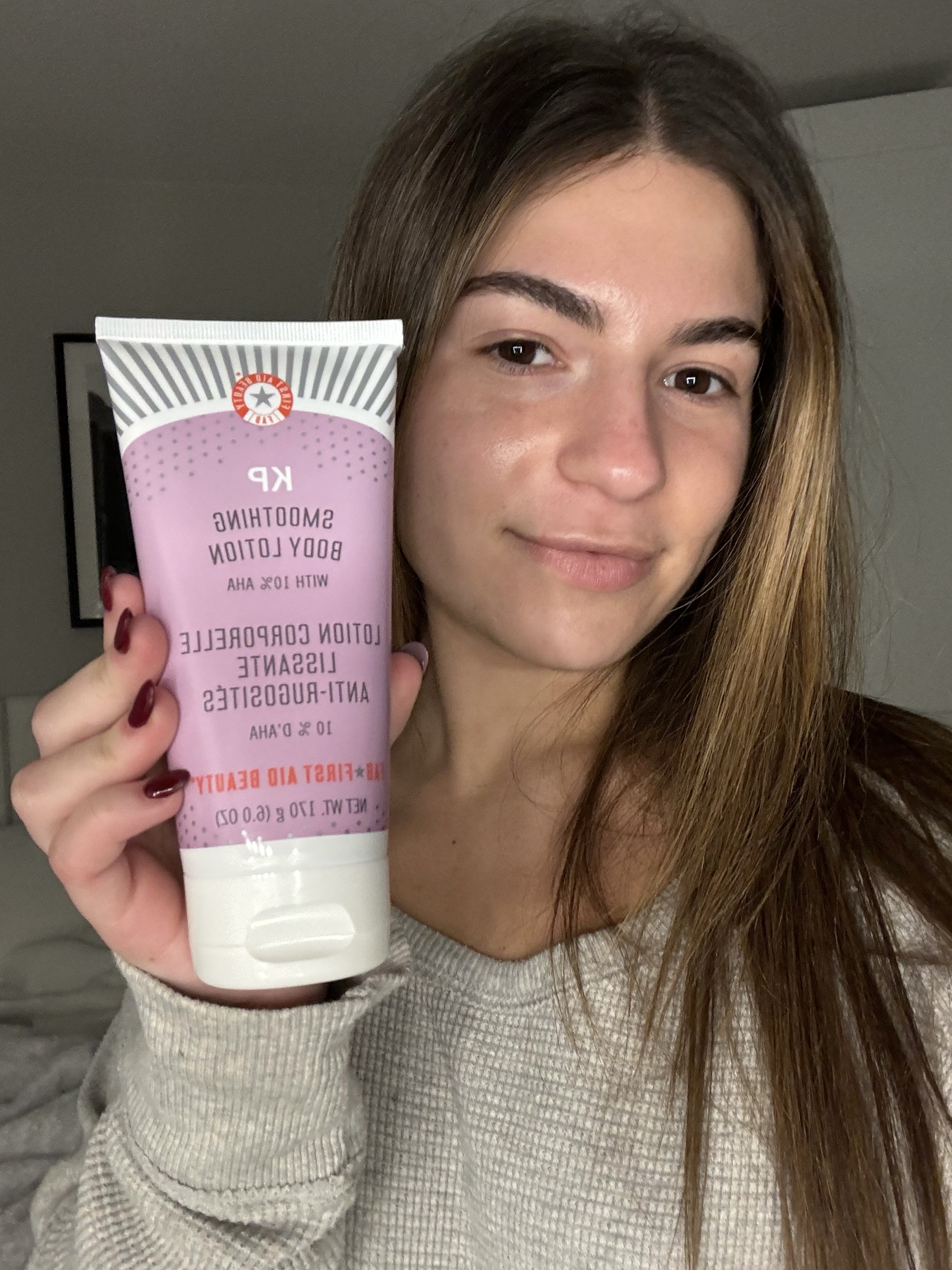
Freelance Beauty Writer Emma Aerin Becker uses the First Aid Smoothing Body Lotion With 10% AHA
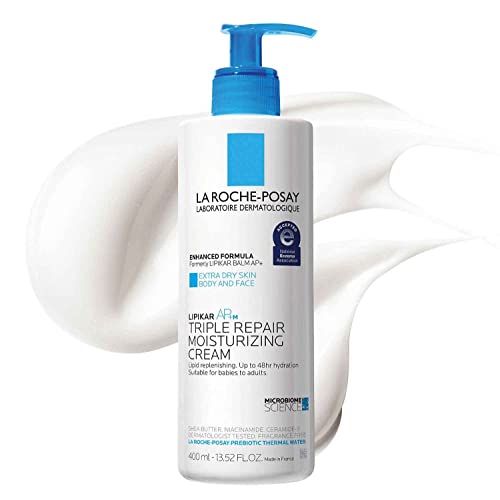
"La Roche Posay Triple Lipikar Moisturizing Cream provides long-lasting hydration to the skin due to the ceramides, shea butter, glycerin, dimethicone, and niacinamide, which has soothing properties," says board-certified dermatologist Aya Ahram, MD. "The unique addition of selenium present in La Roche Posay's thermal water acts as a natural antioxidant, which helps to minimize skin damage by reducing inflammation."
Key Ingredients: Prebiotic thermal water (soothing), ceramide-3 (strengthens skin barrier), shea butter (moisturizing), niacinamide (soothing)
Scent: None
Size: 13.5 oz
Pros: Expert-approved; can be used on face and body; soothing
Cons: Some users find it greasy
Review for MC: "Having sensitive skin lends itself to a journey of trial and error. I've used dozens of moisturizers on my highly reactive, irritable skin, but it's this $20 product that has proven to be a lifesaver for both my face and my body. The thick texture feels incredibly soothing, giving my skin a gorgeous glow. I also love the convenient pump packaging for all-over application!" — Emma Aerin Becker, Freelance Beauty Writer
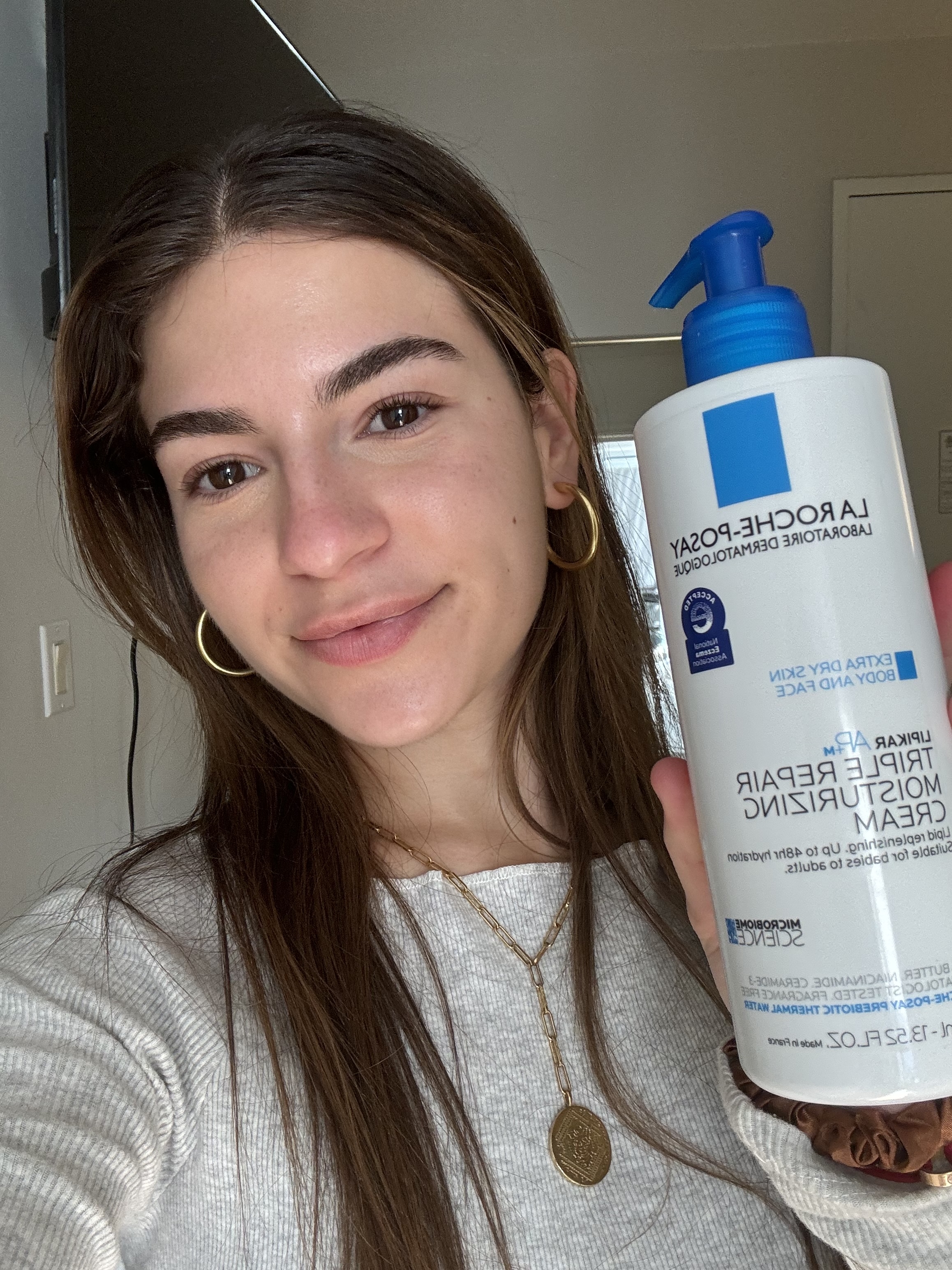
Freelance Beauty Writer Emma Aerin Becker wears La Roche-Posay Lipikar AP+M Triple Repair Body Moisturizing Cream for Dry Skin
Other Body Lotions I Love
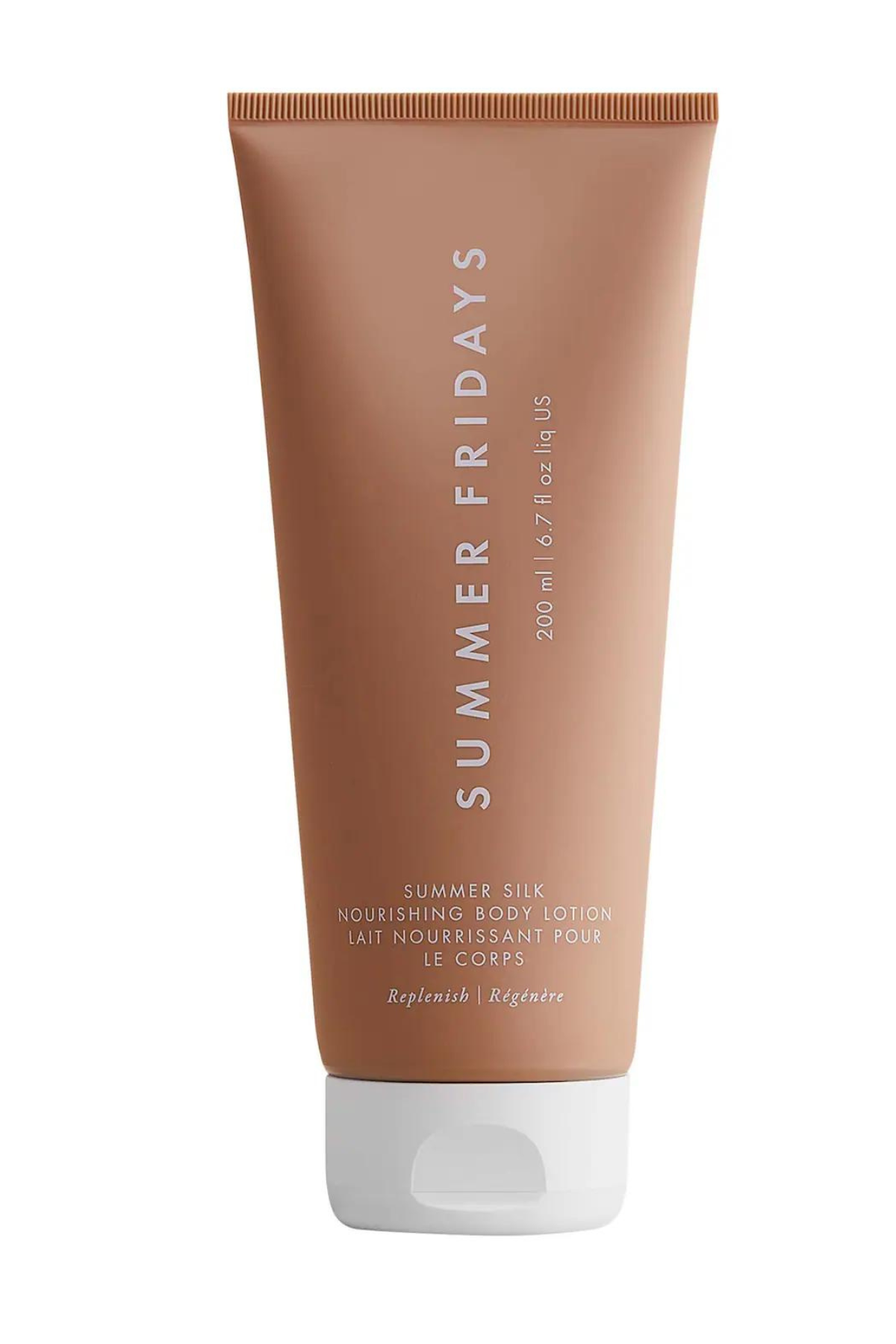
Summer Fridays is one of my all-time favorite skincare brands. Of course, their Lip Butter Balms get most of the hype, but don't underestimate the moisturizers. This product perfectly merges a hydrating feel with a matte finish—my ideal combination for wearing jeans or leggings. Made for all skin types, this body lotion moisturizes skin, has a powdery-smooth texture, and is lightly fragranced with the brand’s signature vanilla-forward scent.
Key Ingredients: Cocoa and shea butter (moisturize), grapeseed, argan, linseed, and rosehip oils (rich in antioxidants)
Scent: Coconut, vanilla blossom, and warm almond
Size: 1.69 oz
What We Love: Vegan; Long lasting hydration
What We Don't: Strong scent
Review for MC: "I don’t know about you, but I find nothing more irritating than feeling like I have lotion on. I want my skin to feel baby soft without the glide, stickiness, or slip of a lotion. I repeatedly reach for this Summer Fridays formula for a 'nothing' feel. It leaves my skin feeling naturally soft (and smelling delicious). Its texture is so invisible that I occasionally forget if I applied my daily dose." — Samantha Holender, Beauty Editor
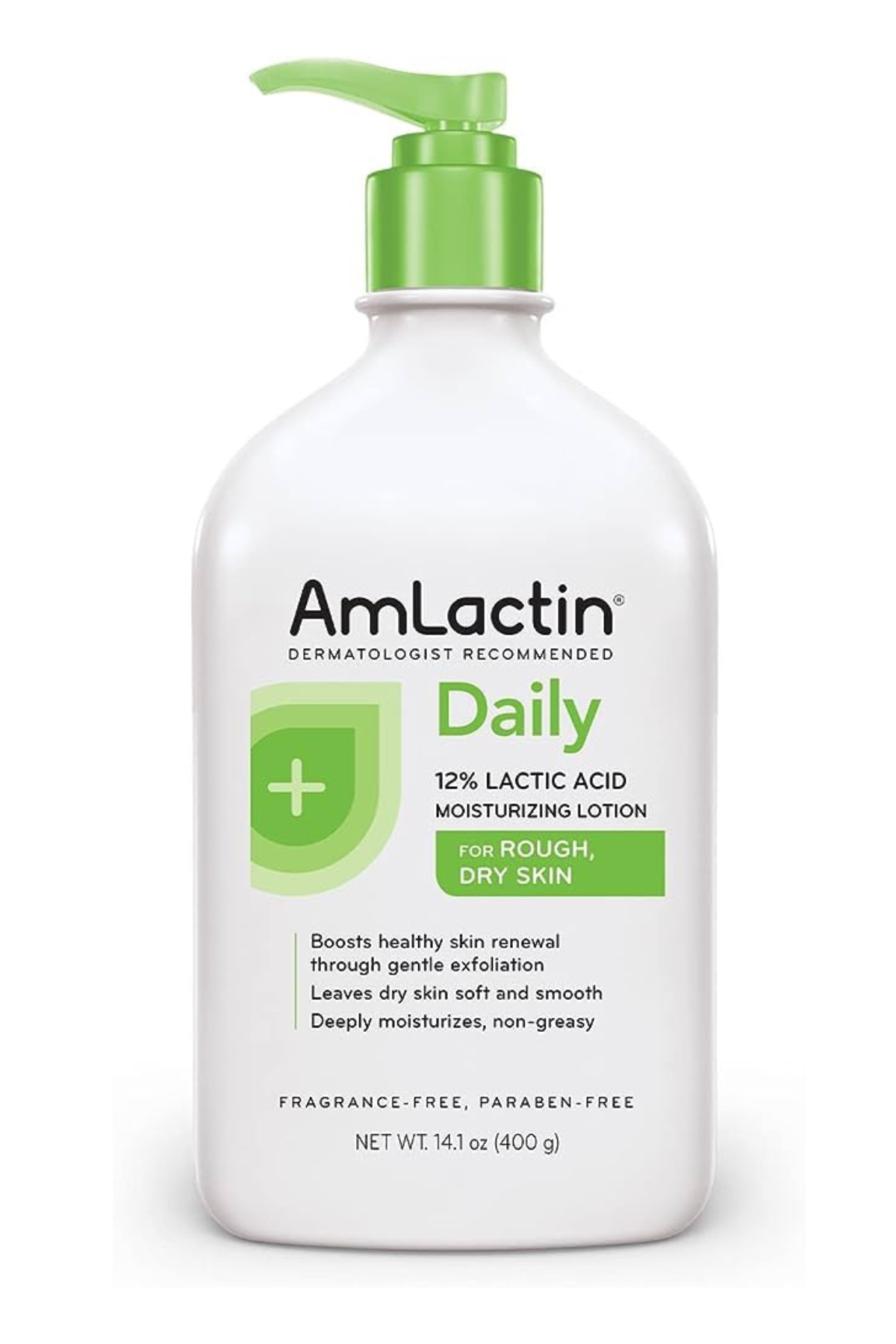
“My all-time go-to body lotion for Keratosis Pilaris is Amlactin with 12 percent lactic acid,” says board-certified dermatologist Adeline Kikam, MD, FAAD. “It's a hydrating but exfoliative lotion that helps soften rough, dry skin.” It’s also fragrance-free, which makes it an ideal option for more sensitive skin types. From a texture standpoint, it’s non-greasy, dries down quickly, and leaves skin feeling supple and nourished.
Key Ingredients: Lactic acid (exfoliates)
Scent: None
Size: 7.9 oz
What We Love: Dermatologist-recommended; Contains 12 percent lactic acid
What We Don't: Smells a bit medicinal
Customer Review: "Recommended by my dermatologist and it works. It smells a bit weird, but it does not linger. It truly made my arms look and feel better. Love this product!" — Amazon
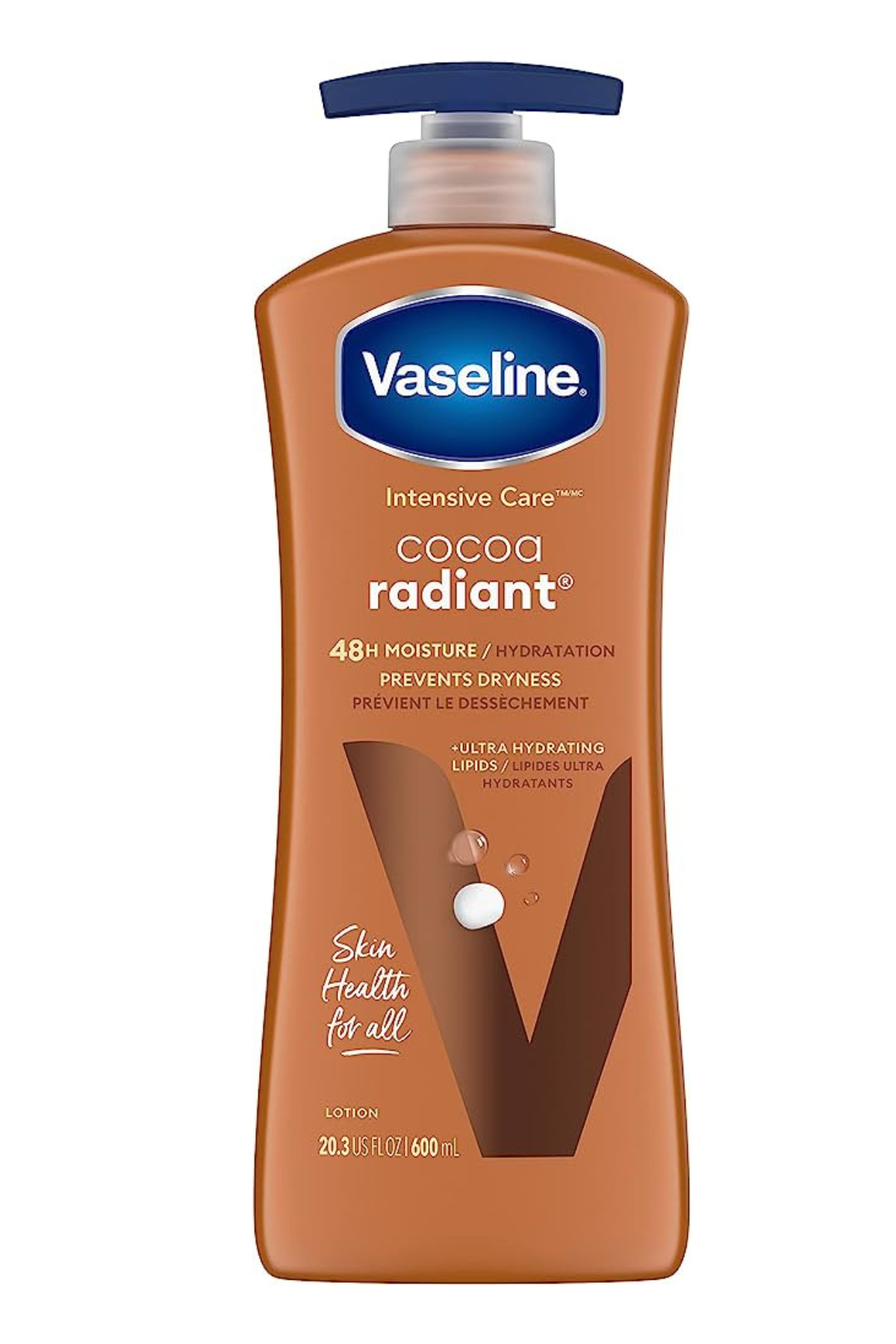
An expert-approved body lotion for under five dollars? Count me in. Vaseline's Intensive Care Cocoa Radiant Body Lotion is deeply moisturizing, keeping skin hydrated for 48 hours. "It’s my unequivocal go-to for two reasons. Number one: the smell; it’s a soft, yet sweet shea butter scent that instantly revives me from the inevitable three o’clock slump," says Holender. "Number two: It is not greasy or sticky in the slightest. I’m typing all day, every day, so having a moisturizer that doesn’t leave a grimy or sticky residue on my hands is imperative."
Key Ingredients: Cocoa butter (moisturizing), ceramides (strengthens skin barrier), lipids (hydrating)
Scent: Cocoa and Shea
Size: 10 oz
What We Love: Affordable; Subtle glow; Convenient pump packaging
What We Don't: Contains sunflower oil, which is not ideal for sensitive skin
Customer Review: "This lotion smells SO good and you get so much for a low price. My skin always looks so vibrant when I apply it." – Target
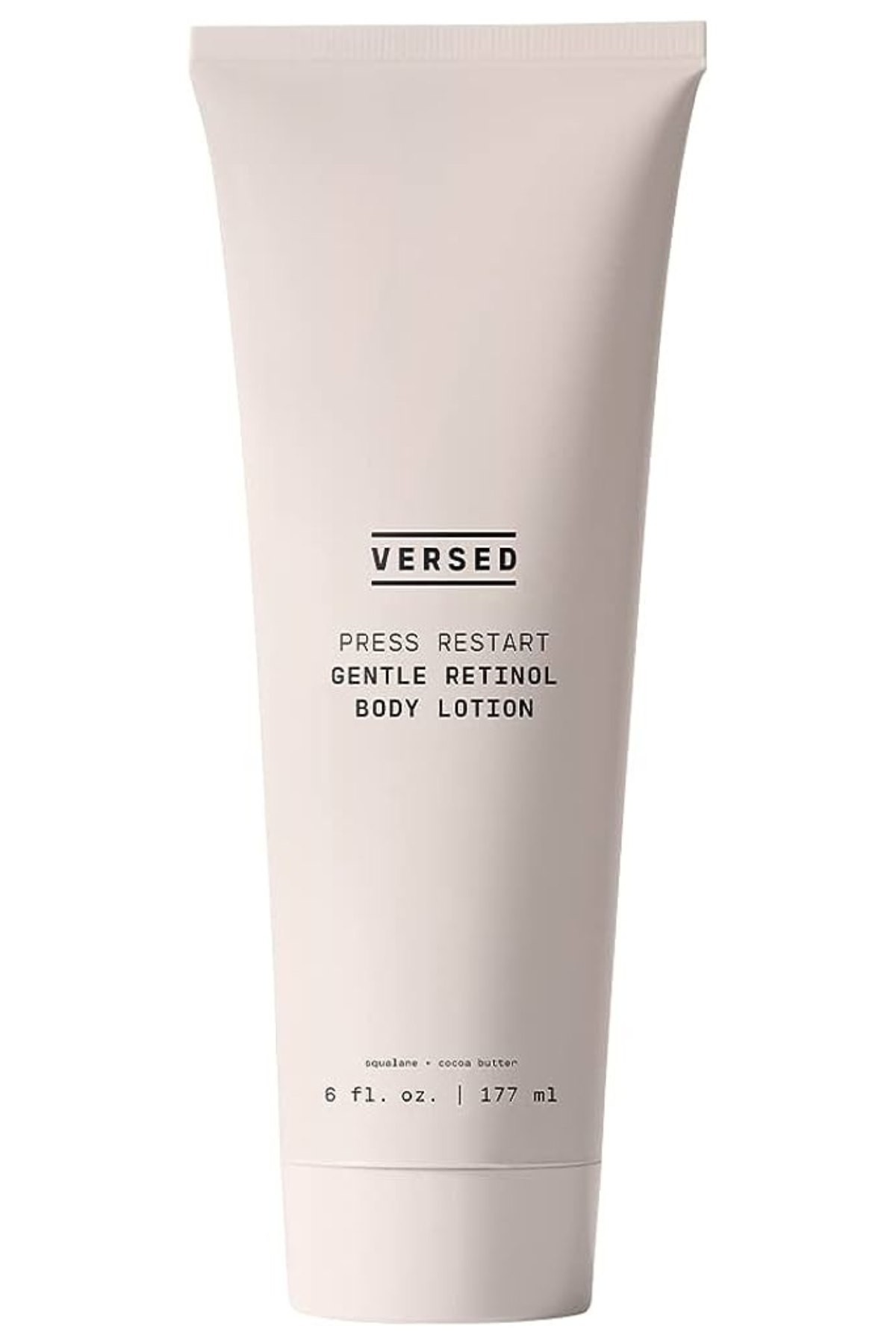
“This Versed body lotion contains encapsulated retinol, cocoa butter, and moisture-replenishing squalane to renew and moisturize skin,” says Dr. Kikam. Such a robust ingredient profile allows this cream to brighten skin tone, reduce breakouts, even skin texture, and firm the skin. “This is a great moisturizer for summer because it’s so lightweight and melts easily into the skin.” Although, it's a winter staple in my body care routine, too.
Key Ingredients: Retinol (anti-aging), cocoa butter (moisturizing), and vitamin E (reduce hyperpigmentation), squalene (locks in moisture)
Scent: None
Size: 6 oz
What We Love: Dermatologist-recommended; Multi-benefit; Affordable
What We Don't: Not super hydrating
Customer Review: "I have had rough and bumpy skin on my arms for most of my life and this is the only product that has left my arms soft and smooth." — Target
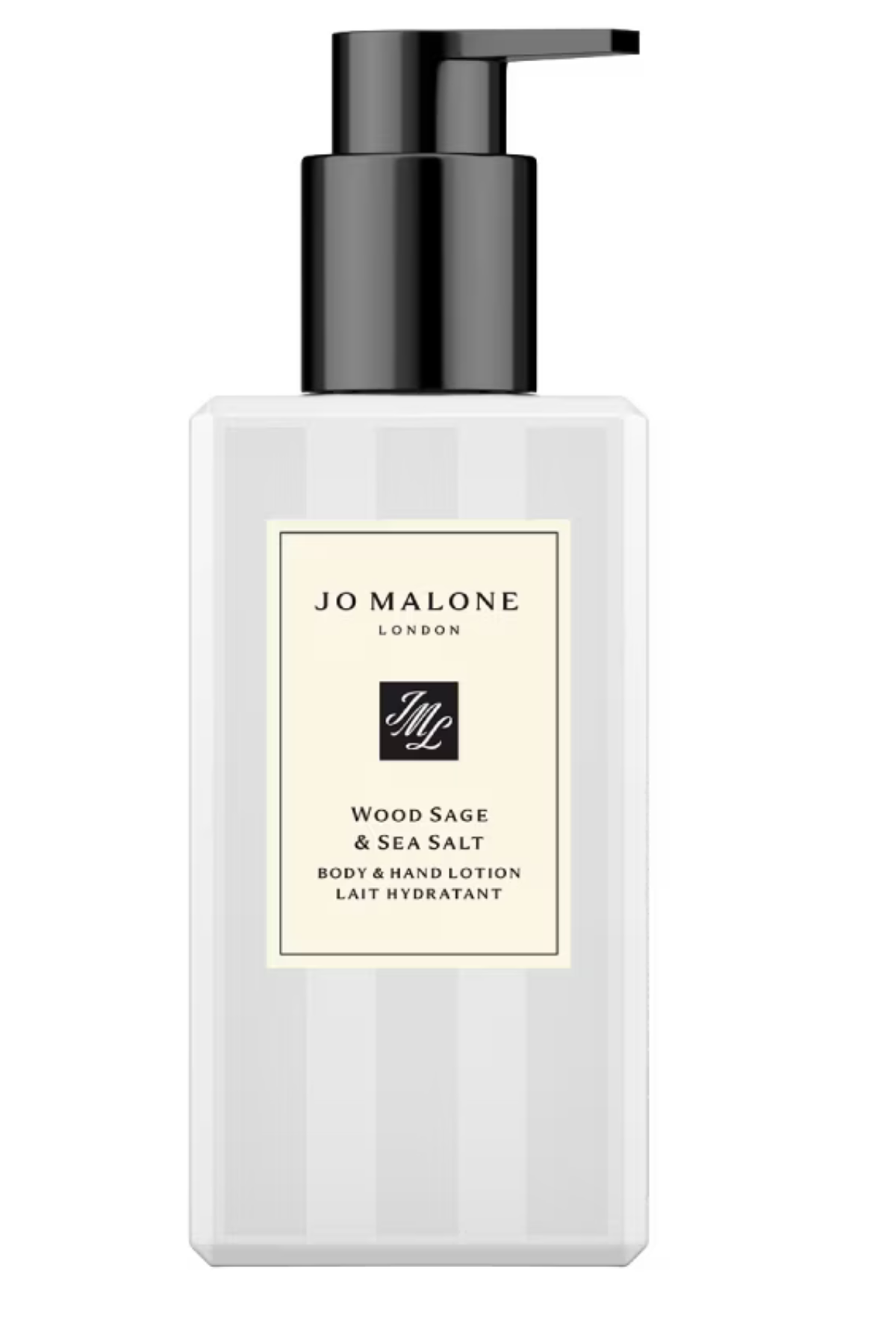
Known for it's incredible scents, it's no surprise a Jo Malone product made our list as the best-smelling body lotion. “Do you ever find a product so good that you create an elaborate (read: absurd) ritual around it? For me, that’s Jo Malone’s Wood Sage & Sea Salt body cream, which I refuse to wear when I’m having a bad day to avoid associating the smell with a negative memory," says Associate Social Media Director Lucia Tonelli. "It has a buttery-yet-light and luxurious texture, and the scent, while categorized as “fresh” and “woody,” has an intoxicating ~je ne sais quoi~ to it. I can’t stop sniffing myself after I apply it—aromatherapy on the go, if you will.”
Key Ingredients: Hyaluronic acid (hydrating), coconut oil (moisturizing), shea butter (moisturizing)
Scent: Ambrette seeds, sea salt, sage
Size: 8.5 oz
What We Love: Smells amazing; Layers well with fragrance
What We Don't: Too heavy for some
Customer Review: "Love this classy scent. Not too strong, but different than what’s out there on the market. My favorite from Jo Malone is mandarin & basil. Now this is my second one." — Bloomingdales
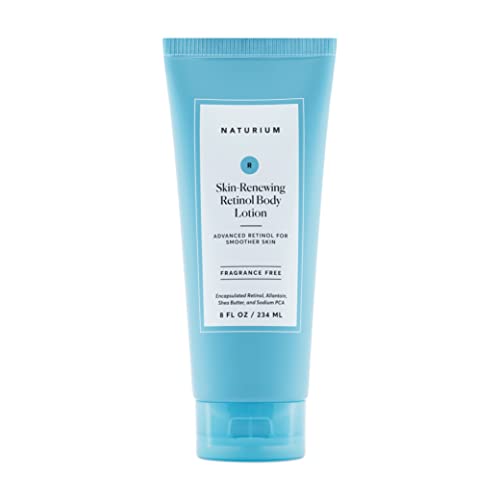
"Naturium Skin Renewing Body Lotion contains retinol to help with skin turnover to help smoothen the skin and improve tone and texture, while also providing soothing properties with the addition of allantoin and shea butter to help combat irritation," says Dr. Ahram. I've used this lotion a handful of times (it's a newer addition to my Rolodex) and love how smooth it’s made my legs feel after just a few weeks of use. It’s even helped even my skin tone and lessen the appearance of scars.
Key Ingredients: Retinol (anti-aging), shea butter (moisturizing)
Scent: None
Size: 8 oz
What We Love: Affordable; contains retinol; smoothing; evens skin tone
What We Don'y: May not be suitable for use immediately after shaving skin
Customer Review: "I absolutely love this lotion! It makes your skin silky smooth. I apply before bed and I can definitely tell a difference in my skin, especially my hands. This is my first time trying any kind of retinol product, and I didn’t have any sensitivity. I think I found my new favorite product line!" — Target
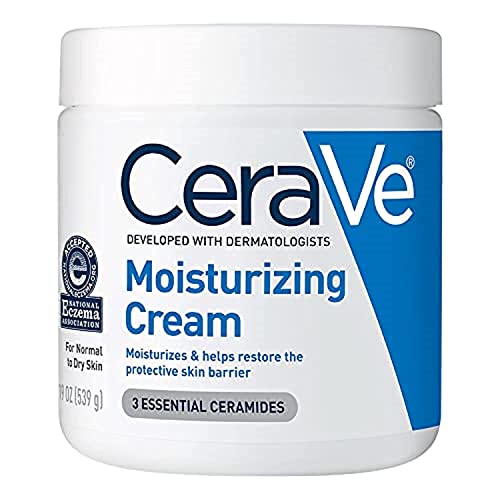
With a promise to work effectively on oily, dry, and combination skin alike, it's no surprise Dr. Ahram counts this drugstore staple as one of her go-tos. “This moisturizer is a staple for many dermatologists due to its gentle properties and effectiveness, as it contains hyaluronic acid, ceramides, petrolatum, dimethicone, hyaluronic acid, and triglycerides, which target skin barrier restoration and protection from a multi-faceted approach," she shares. It’s also great for irritated or damaged skin and has even been awarded a National Eczema Association (NEA) Seal of Acceptance.
Key Ingredients: Ceramides (strengthen skin barrier), hyaluronic acid (hydrating)
Scent: None
Size: 19 oz
What We Love: Expert-approved; has a National Eczema Association (NEA) Seal of Acceptance; rich; works on all skin types; hypoallergenic
What We Don't: Packaging doesn't have a pump
Customer Review: "This cream lotion is my absolute favorite in the winter or whenever my skin is dry, sensitive, irritated, inflamed… you name it; this always gets the job done. It helps to deeply moisturize, soothe and heal any skin irritation. I love to use this all over my body and on my face as well, pretty much anywhere and everywhere, it is so gentle and soothing you really can’t go wrong." — Target
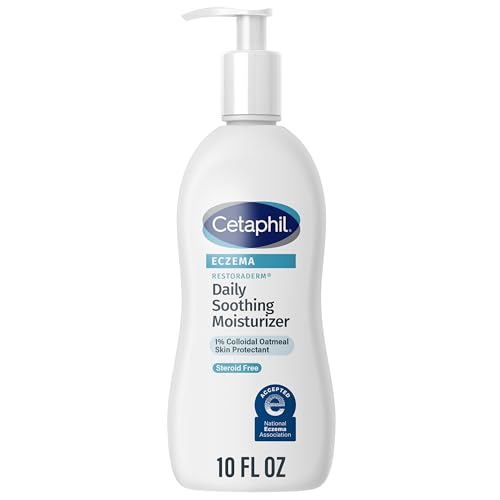
Dry, flaky skin? Consider opting for a body lotion free of fragrances, parabens, and other potentially inflammatory ingredients, like this hypoallergenic one from Cetaphil. "I love Cetaphil Restoraderm lotion," says board-certified dermatologist Amy Wechsler, MD, FAAD, of this no-nonsense pick. "It absorbs quickly and moisturizes all day." The clinically tested lotion also promises to work on sensitive and eczema-prone skin, improving moisture and relieving irritated patches in as little as two hours.
Key Ingredients: Colloidal oatmeal (calming), ceramides (strengthen skin barrier), shea butter (moisturizing)
Scent: None
Size: 10 oz
What We Love: expert-approved; free of fragrance, steroids, and parabens; great for sensitive skin
What We Don't: some users find the formula too thin
Customer Review: "This is by far the best eczema lotion on the market. It is priced slightly on the higher side but I truly think it's worth it. It has a non-greasy feel and is easily absorbed, leaving the skim soft and itch-free while protecting and healing the skin. If you have been looking for a lotion that does it all for your skin, this is definitely worth a try. The other items in this line also work amazing together." — Target
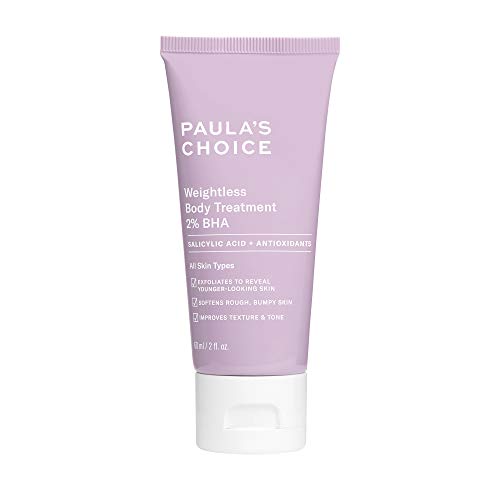
Paula's Choice Weightless Body Treatment 2% BHA is a leave-on body exfoliant-meets-lotion that gently sheds buildup to smooth out rough, bumpy textures and reveal soft, glowing skin. It also keeps skin soft and hydrated and boasts anti-aging properties, like the ability to reduce hyperpigmentation and dark spots. With so many benefits in one bottle, what's not to love?
Key Ingredients: Salicylic acid (exfoliates), vitamin E (reduce hyperpigmentation), chamomile and green tea (hydrating)
Scent: None
Size: 2 oz
What We Love: Affordable; editor-approved; contains BHA; lightweight; free of fragrance and parabens
What We Don't: Small bottle
Customer Review: "This lotion is lightweight and non-greasy. Absorbs onto the skin quickly and leaves skin feeling smooth. It really helps to smooth skin and reduce the appearance of dry, crepey skin. No scent." — Amazon
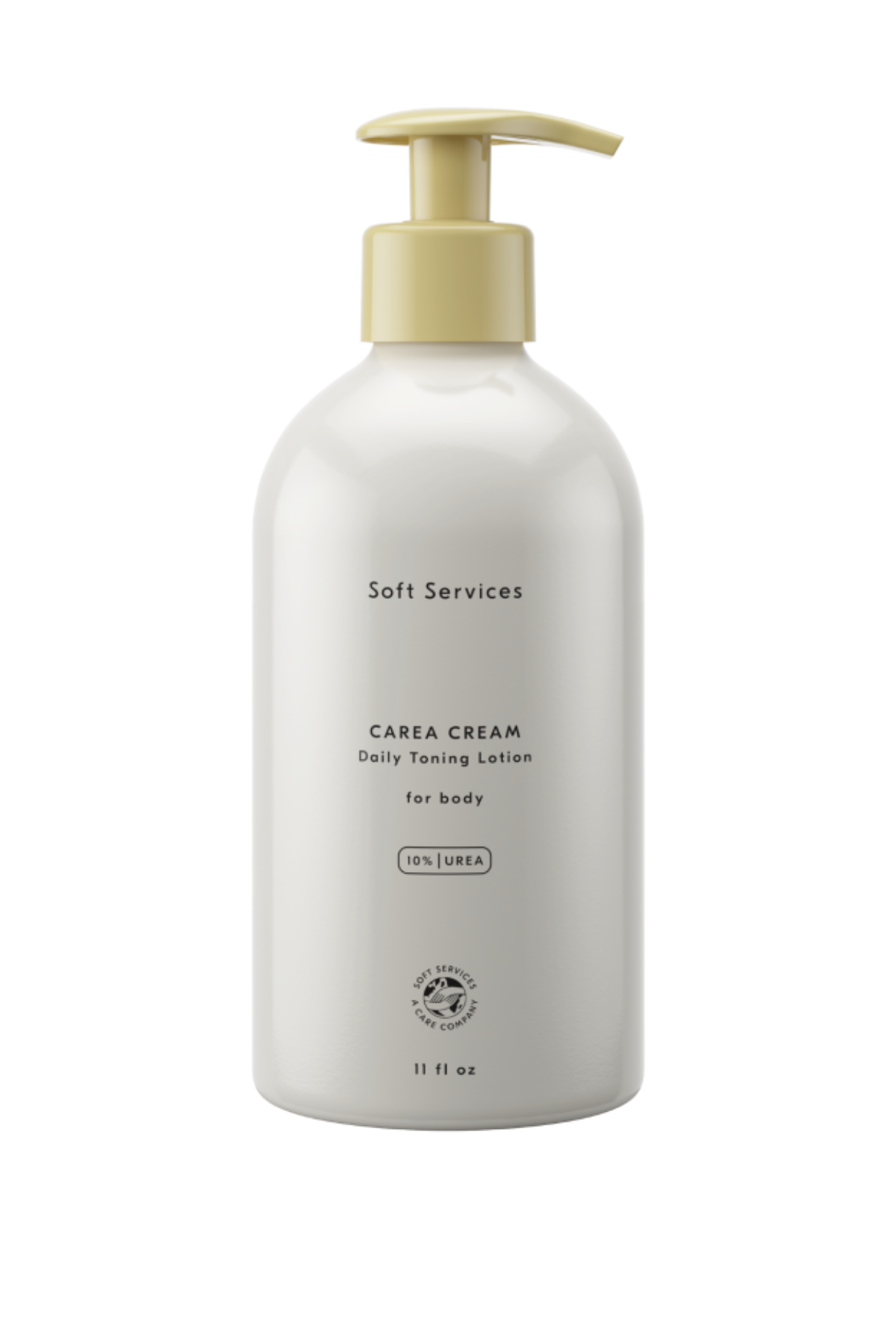
Soft Services Carea Cream is formulated with a focus on urea, a workhorse ingredient that both moisturizes and mildly exfoliates. “After developing an obsession with the brand’s best-selling Buffing Bar (my skin has never, ever been so soft), I decided to try out their Carea Cream," says Tonelli. "It gently exfoliates and breaks down dead skin build-up without irritating—a reminder that our body deserves the same love as our faces do!”
Key Ingredients: Urea (moisturizing), squalene (locks in moisture), collodial oatmeal (calming)
Scent: None
Size: 11 oz
What We Love: Great for bumps and uneven texture
What We Don't: Some report pilling
Customer Review: "The Carea Cream is truly a holy grail product for me. This is the only moisturizer that reduces my KP without drying out or leaving a heavy film on my skin. This cream has been a game changer for managing my severe KP in a high humidity environment." — Soft Services
What to Look for in a Body Lotion
- Ingredients
“Ingredients tell you if the lotion is going to address the specific concerns you want targeted in your body routine,” explains Dr. Kikam. From a hydration standpoint, she recommends seeking out humectants (glycerin, hyaluronic acid, urea), emollients (shea butter, cocoa butter, jojoba oil), and ceramides. These attract water, soften the skin, and lock in moisture, respectively. Having at least one of the above is a baseline for hydration.
For more specific concerns like keratosis pilaris, callouses, or flakiness, Dr. Ahram says to look for moisturizers that have ingredients such as urea, lactic acid, salicylic acid, or even retinol to help with exfoliation, working in tandem with the hydrating ingredients. "This can be helpful for patients with keratosis pilaris or even with thicker, drier skin, such as on the elbows, feet, or knees."
If brightness or fading dark spots is your main pain point, then antioxidants are the MVP. “Vitamin E, C, and green tea extract, for example, have a dual purpose in preventing free radical damage and may also brighten and moisturize skin,” says Dr. Kikam.
Ingredients to Avoid in a Body Lotion
In terms of what to avoid, Dr. Ahram recommends stearing clear of fragrance if you have sensitive skin. "It can cause irritation in people with sensitive skin or atopic dermatitis, as they already have a fragile skin barrier and I prefer to avoid ingredients that can cause irritation." Some can tolerate fragrance without any negative side effects, in which case, go forth and smell like citrus—or vanilla, or flowers.
According to Dr. Greenfield, you should also look for an alcohol-free formula, as alcohol can cause dry patches on sensitive skin.
- Texture
When adding a moisturizer to your routine, consider the weight and texture. If you have extremely dry skin or are targeting dry areas like your heels and elbows, you may want a richer formula. On the other hand, many consumers prefer lightweight formulas because they absorb quickly and don't feel greasy.
“You can choose your texture based on season or weather—thicker consistencies are best for winter to help lock in moisture and lighter or thinner consistency in the summer when it’s hot,” says Dr. Kikam. Her advice: “Choose a texture that you enjoy applying and one that feels comfortable on your skin and is easy to spread.”
- Scent
Scan this list, and you’ll notice that a handful of the best body lotions are from fragrance-first brands. You can opt for a fragrance-free formula that lets your perfume shine through or keep your sensitive skin happy, but you also have the option to layer on a scented body lotion that will replace your go-to scent or enhance the one you wear.
How to Use Body Lotion
When moisturizing, you should show your whole body some TLC. "I think the body should be moisturized daily, especially after a shower," says Dr Wechsler.
But when slathering lotion all over your body, you may find that some areas need more attention than others. "[Areas] most prone to dryness would be the elbows, knees, hands (frequent hand washing/sanitizing), feet, lower legs/ankles, and back (harder to reach), especially as we move into winter as we lose some of the humidity in the air and turn on our heaters," says Dr. Ahram.
Dr. Wechsler seconds that the lower legs often need extra moisture but adds that any part of the body could become dry, so pay attention to what your skin is telling you.
Why Trust Marie Claire
Marie Claire is an authority on body lotions, having tested the best retinol body lotions and researching the top ingredients to ensure smooth, moisturized skin for all skin types. We also tapped three board-certified dermatologists to share their own favorites and help assemble a list of the best, safest body lotions for absolutely everyone.
How We Tested
Marie Claire editors were quick to volunteer their favorite body lotions. After picking 15 dermatologist-approved body lotions, our independent testers (plus a few Marie Claire staffers and dermatologists themselves) tested them. They individually reviewed their moisturizers based on ingredients, benefits, texture, experience, and results.
Meet the Dermatologists

Dr. Nava Greenfield is a dermatologist practicing at Schweiger Dermatology Group. Dr. Greenfield earned her Bachelor’s Degree from Queens College, City University of New York, where she graduated Cum Laude with honors in mathematics, natural sciences, chemistry and biochemistry. Dr. Greenfield attended medical school at the Albert Einstein College of Medicine, Yeshiva University. She completed her internship at Yale-New Haven Hospital and her residency in dermatology at SUNY Downstate Medical Center. Dr. Greenfield has been published in many medical journals, including The Journal of Dermatological Treatment, the Journal of Women’s Dermatology and Pediatrics. Dr. Greenfield is a member of the American Academy of Dermatology, Alpha Omega Alpha Honor Medical Society, Women’s Dermatologic Society and the American Medical Association.
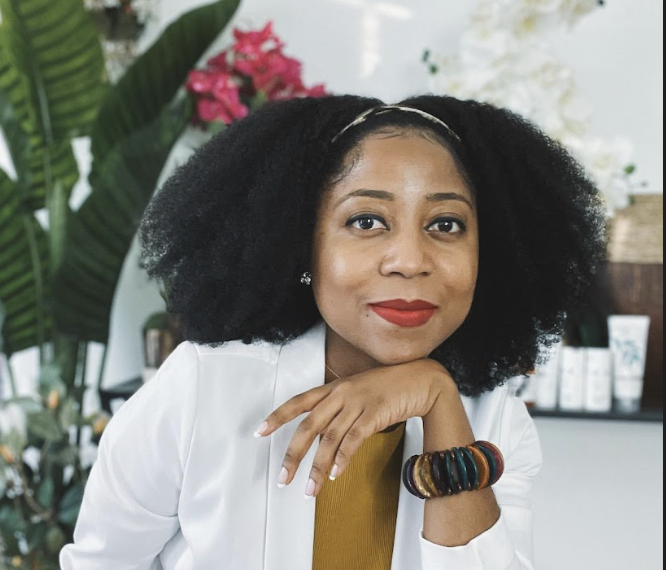
Dr. Adeline Kikam was inspired to become a dermatologist because of the struggles she faced with her own skin while growing up coupled with inaccessibility to dermatologic care. Combined, these experiences fueled her interest in decoding the vast and information-rich field that is dermatology as well as the desire to spread this wealth of knowledge. As part of this mission, Dr. Kikam launched Brown Skin Derm™ via social media at the beginning of her dermatology residency to fill the void of evidence-based information and candid, informative conversations. She’s leveraged social media to create a trusted space for expert-led skin care knowledge as well as highlight common dermatologic conditions and issues, providing greater access to care for melanin-rich skin and creating more equity in the skin care and beauty industries. She also lends her expertise and passion to advocating for improved representation of people of color in the larger discussion on skin care, ranging from information accuracy and accessibility to medical therapy and product formulation to consumer/patient engagement. In addition to discussing medical conditions, Dr. Kikam is experienced in the rapidly evolving world of aesthetic procedures, and she provides reviews on skin care products and features fellow dermatologists and organizations who offer resources for skin of color. Today, her followers are a diverse group of individuals hailing from all corners of the world, including Asians, Latinos, Africans, African-Americans, Middle Eastern, etc. Slowly but surely, the landscape of dermatology is changing and people of color everywhere are demanding to see themselves reflected in the way skin care is discussed. She recently contributed to a newly released comprehensive dermatology atlas that features common skin conditions presented across all Fitzpatrick skin types, a resource she never had during her medical training that is now available to all health care professionals. In 2022, she is launching SkinClusive Dermatology, an in-person and teledermatology clinic with a focus on medical, cosmetic, and hair restoration treatments as well as specialization in skin of color.
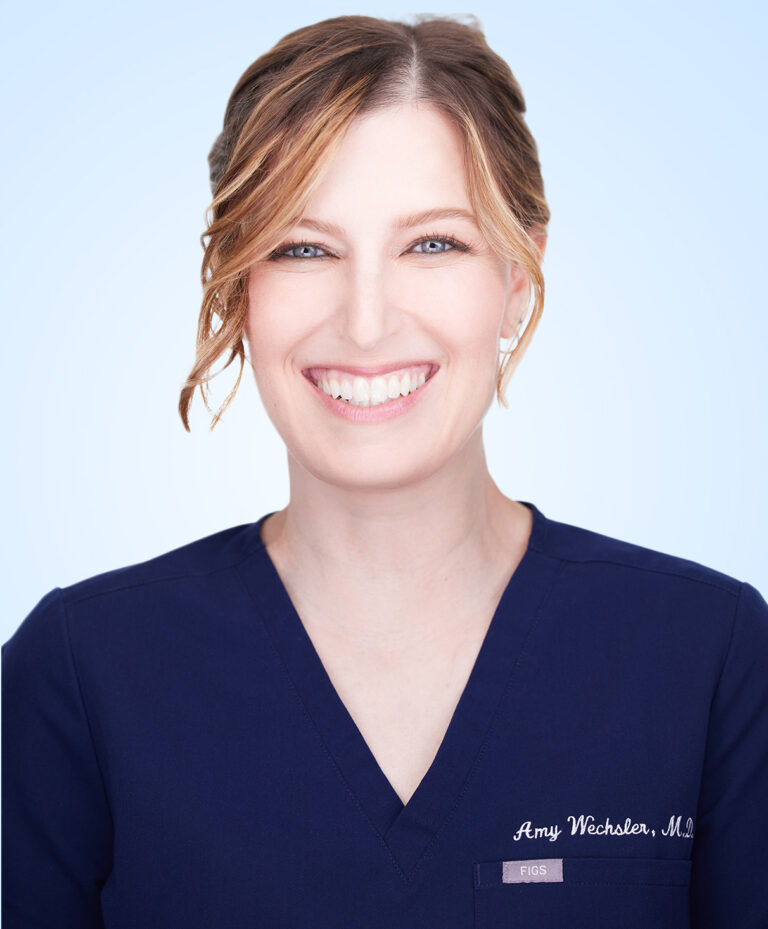
Dr. Amy Wechsler is a double board-certified dermatologist and psychiatrist. In addition to practicing medicine, she hosts the 'Am I Embarrassing You?' podcast with her daughter. She is currently based in New York City.

Dr. Aya Ahram is a board-certified dermatologist currently working at Hudson Dermatology and Laser Surgery in New York City. She treats all skin types and conditions, including acne, eczema, psoriasis, rosacea, and alopecia, and addresses aesthetic needs as well, including Botox, chemical peels, and microneedling.
Stay In The Know
Get exclusive access to fashion and beauty trends, hot-off-the-press celebrity news, and more.

Emma Aerin Becker is a Freelance Beauty Writer at Marie Claire, where she deep-dives into makeup, skincare, and hair trends, rounding up the latest and greatest products. She has a lifelong love of style and beauty — especially when it comes to the way the latest trends and must-have products intersect with celebrity and culture. Emma also works for People magazine as a writer on their parents team, where she stays on the pulse of pop culture and covers breaking celebrity parents news daily. She has been working in the industry for four years, covering topics such as beauty, fashion, pop culture, celebrity news, and entertainment. Her words have also appeared on The New York Post’s Decider.com, Aspen Magazine, Philadelphia Style, Boston Common, Capitol File, College Fashionista, The Crescent, and ViaNolaVie.
- Samantha HolenderSenior Beauty Editor
- Gabrielle UlubayBeauty Writer
-
 The Scent of the Summer Is a Little Bit Pool Water, Plus a Lot of Swimsuit Lycra
The Scent of the Summer Is a Little Bit Pool Water, Plus a Lot of Swimsuit LycraVacation’s new body mists are coming in hot.
By Samantha Holender
-
 In 'Sinners,' Music From the Past Liberates Us From the Present
In 'Sinners,' Music From the Past Liberates Us From the PresentIn its musical moments, Ryan Coogler's vampire blockbuster makes a powerful statement about Black culture, ancestry, and art.
By Quinci LeGardye
-
 Kendall Jenner Has the Last Word on the Best Travel Shoes
Kendall Jenner Has the Last Word on the Best Travel ShoesLeave your ballet flats in your checked bag.
By Halie LeSavage